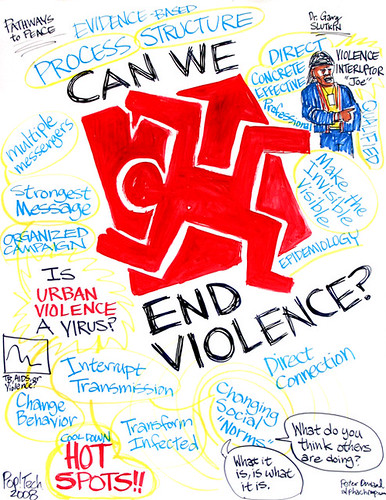Our tour guide points to a nightclub with a brown awning and the windows sealed up with cinderblocks.
He points as we roll by in the minivan. "That's where a lot of things start that end up with someone getting shot."
After scanning the intersection, he slowly turns right. "The nightclub and the high school, stuff starts in those two places and ends up getting finished in the street."
Our guide is a "violence interrupter" for CeaseFire.
This public health organization was founded by Gary Slutkin, a specialist in internal medicine and infectious disease control. Dr. Gary serves as CeaseFire's Executive Director and core strategist for battling the spread of violence as if it were AIDS, TB, or any other deadly epidemic. Instead of refugee camps in Somalia or the Sudan, we're talking urban America.
In Chicago, to be exact.
We are cruising the CeaseFire worker's beat: a section of Engelwood neighborhood on the Southwest side. Roughly the shape of Nebraska, Engelwood lies between 55th and 75th streets, and bracketed by Western Avenue and State Street.
Using violence interrupters to dramatically reduce mortality is considered a viable public health approach to reducing shootings and killings.
The VI role has been recognized by the US Department of Justice as being both unique and effective, stating: "Although many public health campaigns hire people who are adept at reaching target populations, hiring former gang members is not a common approach in the criminal justice field."
The main job of a VI is paying attention and listening for trouble. Their secondary job, is running interference when someone wants someone else dead.
The reason for shootings remain pretty simple: anger and fear fueled by peer pressure, substance abuse, and the need to save face. Revenge shootings are a continuing, cascading problem.
Our tour guide, explains: "When we have that first warm weekend in April, that's when the most shootings happen. People have spent all winter stewing on stuff, waiting to make a move."
Then everyone comes outside and the trouble starts.
During our tour of our CeaseFire worker's beat, he pointing out hot spots (corners, lots, open spaces, blind allies, stores), explaining how he talks young men and women down from the heights of revenge. He attempts to buy time, to buy more time, to stall, to make others aware of the situation, to triangulate, and to let the situation cool off.
The mobile phone is the main lifeline to the vast network of people, places, family members, role models, and follow members of CeaseFire who can be rapidly deployed in front of a situation before it esculates.
This invisible network, the social graph in the parlance of Facebook, is tied together by handshakes, code names, alliances, phone calls, and text messages in a realtime search for what is going on in the neighborhood.
Who knows who? Who has an "in" with which group (the term "gang" is never used) and what has happened? What is about to happen? What will make the situation even more volatile?
 View more videos on CeaseFire, the PeaceTXT Program, and life as a violence interrupter.
View more videos on CeaseFire, the PeaceTXT Program, and life as a violence interrupter.
In order to help CeaseFire team members in their dual mission (sense trouble and interrupt violence), the PopTech Accelerator has acted as convener and facilitator of a multidisciplinary project to explore the potential of mobile technology to amplify a proven approach to reducing violence called PeaceTXT.
This collaborative effort was announced during PopTech 2010.
Using design research and collaborative design, the team is working to understand the ecosystem in which CeaseFire works, to examine technologies used by other crisis mapping organizations, and explore how to innovate for maximum impact.
The measurements are pretty straight forward: Did the number of shootings and killings decrease?
(For real-time tracking of Chicago homicides, see http://homicides.redeyechicago.com/)
Alphachimp Studio Inc. is honored to be small part of this huge design effort that brings together several renowned partners including:
FrontlineSMS:Medic, maker of advanced tools that enable frontline healthcare workers to better serve their communities through innovative, appropriate mobile technologies.
Ushahidi, creator of collaborative mapping platforms that allow for timely sharing and access to crowdsourced information contributed from many different sources.
For more, visit http://poptech.org/peaceTXT
See related post: SOCIAL CRISIS, SOCIAL MAPPING & SOCIAL CHANGE MAY 14, 2010


